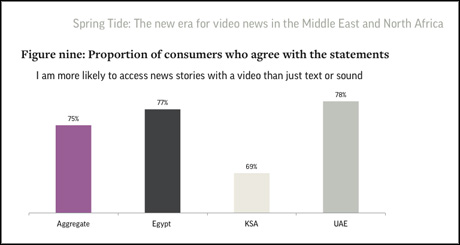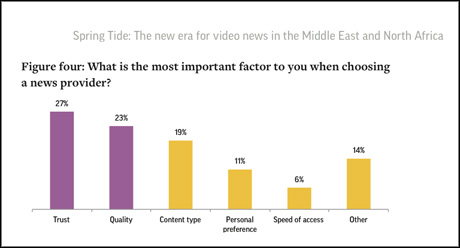
Audiences in the Middle East and North Africa prefer online video content over written news, and value trust and quality over the speed of news delivery, according to a report commissioned by the Associated Press (AP), released today.
The study, called 'Spring Tide: The new era for video news in the Middle East and North Africa', found that 69 per cent of those who consume news online thought watching video content was the best way to access fair and impartial news.
Ian Phillips, AP's Middle East director of news, told Journalism.co.uk: "if you traditionally have read or watched news that has been tailored in a certain way, it can sometimes feel as though the message is too manufactured, whereas video can offer you that immediacy.
"Certainly in breaking news, there's no real way to tailor it in a way that suits your political or business outlook. By watching video, you see what happens, you can make your mind up, you can draw your own conclusions."
The report found that 68 per cent of online news consumers in the region watch video news clips most days, a larger number than in Europe or Asia Pacific, where 61 per cent and 50 per cent respectively said they do the same.
Audiences in the Middle East and North Africa also have an appetite for video because they say it is a medium that presents stories in a way that is easier to understand than other media, according to 83 per cent.
Seventy-five per cent of online news consumers said the presence of video content in a news story meant they were more likely to access it.

Screenshot from 'Spring Tide: The new era for video news in the Middle East and North Africa'
Phillips said video also gives people more reasons to engage with content. "You do see a lot of people consuming news and particularly video on cellphones and tablets in the Middle East, which might surprise some people," he said.
"Sitting in a cafe, everyone's engaging with their phone, so as long as the video can be supported and people can watch it with ease, I think it's certainly proving a preferable way of consuming news."
The importance of trust
Respondents ranked trust and quality as the top two factors which influenced their choice of news providers. This contrasts with previous research done in Europe and Asia Pacific, where speed of access was considered one of the main drivers of this decision – 42 per cent said speed was important in Europe, and 43 per cent in Asia.
Phillips said the emphasis on trust could be explained by looking at the history of the region.
"It has been and still is a region in flux," he said. "We had the Arab Spring, people finding a new voice, perhaps not trusting those traditional sources of information that could be state-run organisations where there's been a controlling of the message. In some extreme cases there's even controlled access to the internet."
In the Middle East and North Africa, six per cent of respondents said speed was the most important element to consider when deciding where to get the news.

Screenshot from 'Spring Tide: The new era for video news in the Middle East and North Africa'
Social networks and news
Social media also plays an important role in delivering the news to people in the region. Fifty-nine per cent of those who followed online news said they found most of their news through social media, and 28 per cent used social media as their first port of call.
Respondents said they used a variety of sources for news, including websites (50 per cent), friends' accounts on social networks (50 per cent), national TV (46 per cent), international TV (33 per cent), and the accounts of news providers on social networks (33 per cent).
Phillips told Journalism.co.uk social media ensures the stories of international news providers have an impact in the region of origin.
"Sometimes the foreign media doesn't think of the impact they're going to have in the country they're actually based in or where the story is being done," he said.
"Traditionally foreign media has presumed that the impact will all be done around the world. We are foreign correspondents and that's where the impact will be."
He said an AP interview with Egyptian president Abdel Fattah el-Sisi was "as popular, if not more popular" in Egypt than anywhere else.
The survey also showed TV was a primary medium for keeping up to date with the latest news, and TV channels were the main source of breaking news for 43 per cent of the people surveyed.
It highlighted watching TV as a more family-friendly and social activity than browsing the internet for stories. Ninety-seven per cent of 19 to 44 year-olds in the region said they talked about the news in general, and they consumed 72 minutes of news each day on average.
The report was produced by Deloitte and Ipsos MORI, who surveyed 18 to 44 year-olds in Egypt, the UAE, and Saudi Arabia. A sample of 1000 respondents was chosen in each country and surveyed online during March and April 2014, and an offline survey of 1500 people was also conducted in each market.
Free daily newsletter
If you like our news and feature articles, you can sign up to receive our free daily (Mon-Fri) email newsletter (mobile friendly).
Related articles
- Ofcom: BBC One, ITV and Facebook are the most used news sources in the UK. In that order
- Under-35s feel 'less anxious' about getting news from trusted brands than on social media
- Weekly journalism news update: Memes, mobile journalism and millennials
- Tip: Take note of these global news habits which will affect the journalism industry
- Reuters Institute report highlights UK readers' behaviours on desktop when news breaks, and the 3 news brands that come on top









